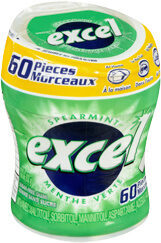
Barcode: 064900407475
Excel Spearmint
DOUBTFUL
📝 Reason: Several ingredients require source verification for Halal compliance. Without full production transparency, cautious avoidance is advised for observant Muslims.
🏷️ Category: Snacks, Sweet Snacks, Confectioneries, Chewing Gum, Sugar Free Chewing Gum
📄 Certificates: None
Ingredients:
Details
Understanding the Halal Status of Excel Spearmint
Excel Spearmint is a popular sugar-free chewing gum loved for its refreshing flavor. However, when it comes to its Halal status, the verdict is ‘doubtful.’ This raises the essential question for many observant Muslims: Is it suitable for consumption? Let’s delve deeper into the ingredients and E-numbers to understand better the Halal compliance of this product.
Ingredients Breakdown
The ingredients of Excel Spearmint include:
- Sorbitol
- Maltitol
- Gum base
- Glycerin
- Gum arabic
- Natural and artificial flavors
- Soy lecithin
- Aspartame
- Acesulfame-potassium
- Carnauba wax
This mixture leads to some uncertainty regarding overall compliance due to the potential non-Halal sources in specific ingredients.
Analyzing Each Ingredient
Sorbitol (E420)
Sorbitol is a sugar alcohol commonly used as a sweetener and humectant. Its Halal status is currently questionable because verifying the source is challenging, hence requiring caution if being considered for Halal diets.
Maltitol (E965)
Similar to Sorbitol, Maltitol is often used in sugar-free products. However, the ambiguity about its manufacturing process could pose a risk for Muslims seeking Halal-certified items.
Gum Base
The gum base in Excel Spearmint is considered permissible in Islam, providing reassurance for consumers looking for Halal products. However, transparency about its manufacturing process can enhance clarity.
Glycerin
Glycerin is commonly derived from both plant and animal sources. While it is generally accepted as Halal, verification of the specific source matters. It’s wise for consumers to request detailed proof from manufacturers.
Gum Arabic
This natural gum is Halal and is used as a thickening agent. It boasts a long history of being accepted within the Muslim community, ensuring safety in consumption.
Natural and Artificial Flavors
The sources of both natural and artificial flavors can vary greatly, leading to some uncertainty about their Halal legitimacy. Since there are no specific details regarding their origin, cautious avoidance is recommended.
Soy Lecithin
Typically derived from soy, lecithin is considered permissible, but again, ensuring its Halal status requires source confirmation.
Aspartame
This artificial sweetener is generally regarded as Halal but being cautious is advised, as the production methods may differ.
Acesulfame-Potassium
Like Aspartame, Acesulfame-Potassium is typically Halal, though conditions of production remain an important factor.
Carnauba Wax (E903)
This plant-based wax is often used as a coating agent. The Halal status is considered acceptable; however, verifying purity is still essential.
Final Considerations
The overall Halal status of Excel Spearmint is classified as doubtful due to several ingredients that require source verification. With the absence of complete transparency in production processes, cautious avoidance is advised for observant Muslims.
Ultimately, if you’re seeking Halal-certified products, consider exploring options that provide clear certification and transparent sourcing. It’s always best to consult with product manufacturers or rely on well-known brands with verified Halal compliance.
